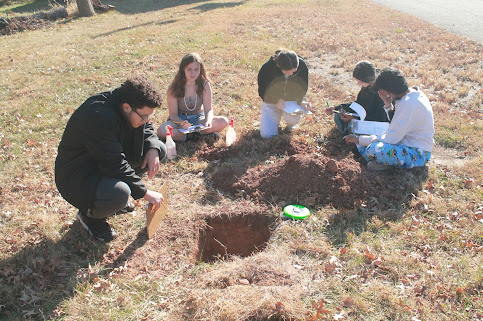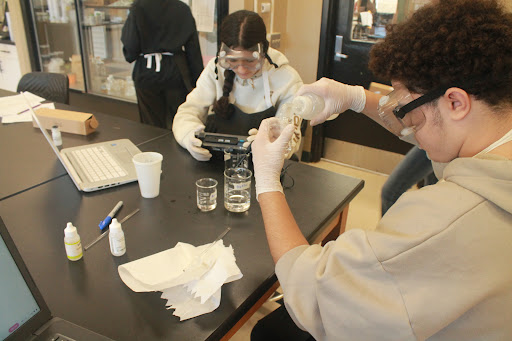Celebrating 2024-2025 School Year
Awards, scholarship, biodiversity project, art project, FFA state convention, and a fundraiser helping reconnect with graduates.
Students did very well in FFA Career Development Events (CDE's) at the state level this year.
Here, our Fruit & Vegetable CDE team earned first place by earning enough points to win our first First Place Team banner which students are proudly receiving at NJ FFA State Convention at Monmouth University in May. One member of the four student team also took first place as an individual competitor. This banner is now proudly displayed in our classroom.
One student, also on the Environmental & Natural Resource CDE team, again placed first as an individual.
And our final top award this year was for a student placing second as an individual in the Veterinary Science CDE.
We are very fortunate to have the support of the Bridgewater Garden Club (BGC) over the years. Ms. Lane and Mrs. Schoefield have been working hard with BGC to support further student post secondary studies. One of our graduating seniors was honored to receive this year's BGC Achievement Award. The student receiving the BGC Achievement Award this year will be attending University of Vermont to study Plant Biology. Students submit a written application, scholastic records, and a letter of recommendation. This is the 12th year and higher than the 12th recipient to be awarded. Thank you BGC for your continued support.
The two photos above show SCVTHS's peace garden area located just outside of the main lobby. Students help remove exotic invasive plants as well as most of the exotic plants that were planted here. We left three exotics that are not invasive at this point, and for the most part, worked this space to be a clean slate to start from again.
This project is a continuation of planting native plants to support moths, butterflies, and native bees (both bumble bees and solitary bees). In addition there are a couple non native plants that support generalist insect pollinators. Several species being planted on site were raised from wild collected seed on SCVTHS campus grounds by students. Remaining seed as purchased by the Environmental Club who also funded purchasing growing trays for optimally sized plants for this project. In addition, a collection of plants were donated by Sunset Farmstead and Pinelands Nursey both wholesale nurseries of Columbus NJ. Students got to work with Sunset Farmstead staff and plants to learn more about a small collection of native and pollinator plants and participated in a lecture presented by Pinelands Nursey to learn about the importance of using native plants in our New Jersey Landscapes.
Using seed (collected from campus and purchased from a local native seed provider) students then learned how to cold treat the seed, plan for seedling development and nursing, and finish by planting and maintaining. Many thanks to all the supporters involved in this project: SCVTHS Environmental Club, SCVTHS admin., Daryl Kobesky and Carrie Stanker of Sunset Farmstead, Bruce Crawford of Morris Co Park Commission, Maria Scarpantonio graduate and Ernst Seed Employee, Steve Knezick of Pinelands Nursery. We have other projects developing for campus and will be sharing these as well.

Seen above are three Agricultural Science students of nine total that worked on an art project lead by our student teacher Ms. Khalid. Students were first given a small 3 inch square piece of paper to make a concept draft of their component. Ms. Khalid asked each art participant to draw what they see in their mind when they hear the word agriculture. Ms. Khalid then lead students through organizing their final copies onto a canvas and supplied art materials to complete the work. The finished piece will be featured in a Rutgers University display before coming here to be displayed for a short time. This project helped student ground themselves in between studying for their Agricultural Science CASE final exams.
Our FFA Chapter Officer team posing for a picture during a break at NJ FFA State Convention in May.
We held an Ornament Night fund raiser in December 2024 and invited graduates to come back and reminisce. Four graduates are pictured above. Thanks to Russel (Electronics tech), Elizabeth (Medical Tech), Jonathan (Plant Biology and NASA hopeful), and Kimberly (Vet Tech) for joining us that night. It was great to see them and others not pictured here.
















































